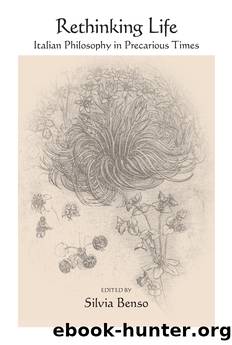Rethinking Life by Silvia Benso;

Author:Silvia Benso;
Language: eng
Format: epub
Publisher: State University of New York Press
Published: 2022-07-15T00:00:00+00:00
Between Crystals and Smoke
The being of life is irreducible to substantial presence because life is a process that is always on the verge between crystals and smoke. It is the precipitate of a negotiation between a deterministic order and a stochastic disorder; it is an uninterrupted creation that emerges as âthe compromise of a liquid vortex, between the redundancy of the crystal and the complexity of smoke.â3 To be a living being does not mean to be in a specific state. Rather, it involves an incessant dynamic of disorganization and reorganization in which lumps of matter and energy seem to rebel against a natural necessityâas if they were escaping from the need of their own dissolutionâthat nevertheless constitutes them by transforming disorder into organization and noise into information. Life-being (essere-vita)âthe being of life, being life, being aliveâmeans being steeped in some sort of struggle of nature against itself, as if life were some kind of an aporia of nature; as if life were the event that leads nature to the extreme limit at which nature discloses some form of unnaturalness or, at least, of resistance against its reduction to a physicalist concept.
This is what emerges from Xavier Bichatâs Recherches physiologique sur la vie et la mort. In this work, the major French physiologist of the Revolutionary period proposes what is considered to be one of the most powerful definitions of life in the course of Western thinking. Bichat writes that âlife consists in the sum of the functions, by which death is resisted.â4 As evident, we are not confronted here with a definition that tells us what life is. On the contrary, we are told what life is not, that with respect to which life presents itself as an opposition. If there is something that is, something that has the characters of substance and presence, in Bichatâs definition, that is, death or, as it were, materiality as dead matter. Death is what is presented as the normal condition of being, as the standard condition in relation to which life represents a form of resistance, an oppositional action.
Bichat does not tell us, then, what life is. He does not indicate any substance that may be identified with life. Yet he says a lot about the way of being of that which lives. He says that the living being is the labor of a process that is inevitably destined to end. Life is, for Bichat, resistance and struggle to persist in the condition of never being a still substance. In this tension to persevere, which has nothing to do with the will because it does not imply a âbeyondâ life itself, one realizes that precisely this movement is, simultaneously and in the same respect, that which both makes beings alive and leads them to death.5 Death is never given according to the logic of certainty, though. The molecules of life are in fact subject to a randomness that is never entirely controllable or governableâunless, that is, they give up their being alive
Download
This site does not store any files on its server. We only index and link to content provided by other sites. Please contact the content providers to delete copyright contents if any and email us, we'll remove relevant links or contents immediately.
Women and Jewish Marriage Negotiations in Early Modern Italy by Howard Tzvi Adelman(380)
Warrior King by Wilbur Smith(324)
18 real-life stories of serial killers and murderers with solved and unsolved killings from the USA, UK, Europe, and beyond. by Ben Oakley(265)
Who's Who in the Zulu War, 1879: The British by Adrian Greaves Ian Knight(254)
Violence and Emotions in Early Modern Europe by Susan Broomhall;Sarah Finn;(240)
The Battle of Austerlitz by 50minutes(228)
The American Crisis by Unknown(224)
The Seeker by S. G. MacLean(203)
The Origins of French Absolutism, 1598-1661 by Alan James(200)
The Dutch East India Company and British East India Company: The History and Legacy of the Worldâs Most Famous Colonial Trade Companies by Charles River Editors(199)
Invisible Worlds by Peter Marshall(183)
The Traitor of Colditz by Robert Verkaik(182)
A Genius for Confusion by Richard M. Fried(182)
The Slave Trade in Africa by Simon Webb;(179)
Fires of Faith by Catholic England under Mary Tudor(177)
Youth, Heroism and War Propaganda: Britain and the Young Maritime Hero, 1745â1820 by D. A. B. Ronald(176)
The Opium Wars: Exploring the Addiction of Empires from Beginning to End by Ramos Adrian & Compacted History(175)
Interest and Connection in the Eighteenth Century by Jacob Sider Jost(175)
The Thirty Years War â Complete by Friedrich Schiller(175)
